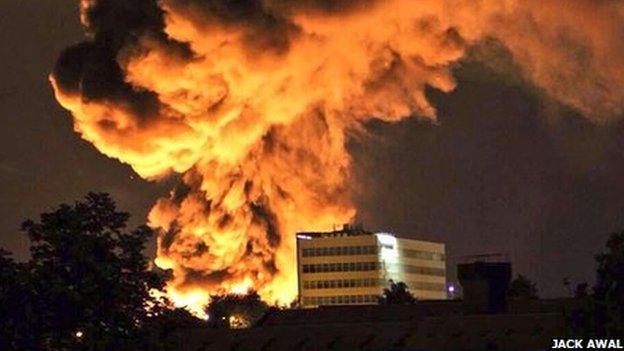Supercharging the humble 999 call with streaming video
- Published
- comments

The fire in Smethwick involved 100,000 tonnes of plastic recycling material, produced a 6,000ft smoke plume and is thought to have caused £6m damage to the Jayplas depot
I recently went along to the West Midlands Fire Service HQ in Birmingham to hear them discuss some new ideas they've been looking at to "supercharge" the traditional 999 emergency call.
A year ago, the service was still dealing with one of the largest fires we've ever seen in the West Midlands.
A blaze at a plastics recycling plant in Smethwick thought to have been caused by a stray Chinese lantern.
There's been much praise for the way all the emergency services handled the Smethwick fire. But it's not a surprise to learn that the initial response was much smaller than would eventually be needed.
Ninety second window
I was played the first 999 call received that day and found it hard to work out exactly where the caller was calling from let alone the scale of the fire itself. The dispatcher in the control room had just 90 seconds to answer, assess and send out the right resources. In this case, once fire fighters arrived at the scene and saw the size of the blaze they quickly radioed in for more equipment and people.
Since then, Matthew Wroughton from the service has been working to improve this situation by using technology most of us have in our pockets. He wants to turn our smart phones into mobile cameras that can allow the emergency services to assess the scene before they arrive giving them vital extra minutes to plan ahead.
Around 65% of emergency calls are now made by mobile phone and many of those are smart phones with built in cameras. Matthew's idea is that when you make a 999 call you will also be sent a text which contains a link to a web page. Click on the link and your smart phone starts streaming video of the scene directly back to the fire service headquarters.
In the control room they can instantly assess what sort of resources a fire will need. It's a nifty idea and it's surprising to learn that no one has really tried anything like this before.
Privacy problems?
The team has already overcome many interesting problems on the technical side, it's even possible that the phone companies might make a data call streaming video footage of an emergency free just like a 999 voice call. Indeed from a technical standpoint it would only take about 8 weeks to get a pilot up and running.
But there are problems. The major concern is worries about privacy. But it might also be difficult for dispatchers in the control room to be confronted with images of a disaster that usually only fire fighters on the ground have to deal with.
The fire service is interested to know what you think of the idea. You can tweet them @WestMidsFire, external or @999eye1, external Or contribute to their blog page, external about all this.
If the problems can be sorted, then a pilot could start by the end of the year. One day our smart phones could help fire fighters tackle blazes much more effectively than before and perhaps even save lives.